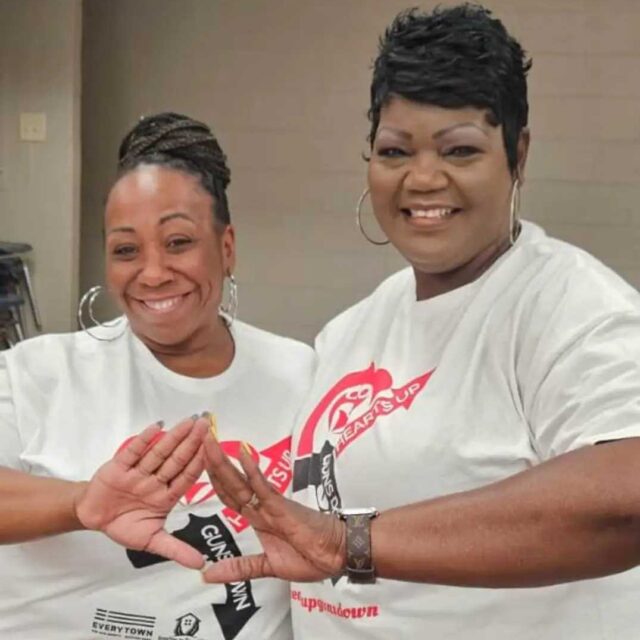Not All Men Are the Problem, But All Men Can Be Part of the Solution to Domestic Violence

10.14.2024
Photo: Callynth Photography
National Domestic Violence Hotline
If you or someone you know is experiencing domestic violence, call the National Domestic Violence Hotline at 1-800-799-7233, available 24/7, for confidential assistance from a trained advocate.
You can also find more resources on legal assistance in English and Spanish at WomensLaw.org.
My name is Jeremy Flowers, and I am the Director of Marketing and Public Relations at the East Texas Crisis Center (ETCC).
I joined ETCC 18 years ago and have held various roles in the organization. I often say that I first came to this work “by accident.” My work helped me recognize that I have personal connections to the experience of domestic violence. That realization cemented my commitment to be part of the movement working to prevent domestic violence.
At ETCC, we help connect people to the resources and services they need to escape domestic violence situations and navigate the healing process. We also work to inspire cultural change. We have thought-provoking conversations with young men in the community. These discussions examine the societal beliefs, attitudes, and behaviors that promote sexism and violence against women.
Intimate partner violence affects people of all genders and sexual orientations. However, the impact of abuse—including rates of severe physical violence and violence inflicted with a firearm—is predominantly experienced by women with male partners.1Women report lifetime IPV that resulted in a significant impact (e.g., medical care) at a rate of 24 percent, compared to a rate of 11 percent among men. Women also report experiencing higher rates of severe physical violence at a rate of 21 percent, compared to a rate of 15 percent among men. Smith et al., “The National Intimate Partner and Sexual Violence Survey (NISVS): 2015 Data Brief—Updated Release;” Emma E. Friedland and James Alan Fox, “Gender Differences in Patterns and Trends in US Homicide, 1976–2017,” Violence and Gender 6, no. 1 (2019): 27–36, https://doi.org/10.1089/vio.2019.0005.
“Not all men are the problem, but all men can be part of the solution to domestic and intimate partner violence.”
—Jeremy Flowers, Director of Marketing and Public Relations for the East Texas Crisis Center
One of my early roles at ETCC was working directly with boys and men to foster healthy masculinity and prevent violence. Men have a collective responsibility to work toward efforts to support survivors and prevent violence. And we can do that in our homes, in our communities, and in society at large.
I often give presentations or do speaking engagements about domestic violence prevention. Some of my most memorable moments at ETCC have come after these talks. I’ve had men share that they had an “aha” moment during my presentation. Many times, they’ve asked how they can be more involved.
Not all men are the problem, but all men can be part of the solution to domestic and intimate partner violence. We must prioritize meeting survivor needs. But we also have to work to address the systemic issues at play.
“Men have a collective responsibility to work toward efforts to support survivors and prevent violence. And we can do that in our homes, in our communities, and in society at large.”
—Jeremy Flowers, Director of Marketing and Public Relations for the East Texas Crisis Center
The presence of a firearm increases the risk of intimate partner violence homicide. At the ETCC, our primary mission is to provide safety to survivors. That means gun violence prevention is a critical component of our efforts. The ETCC grounds these efforts in survivor-centered approaches. That allows us to address risk factors for intimate partner violence at a systemic level while prioritizing survivor safety.
In recent years, we’ve grown our work around intimate partner violence and firearms. In 2023, we received a grant from the Everytown Support Fund Domestic Violence Grant Program to help us continue to do so.
The Everytown for Gun Safety Support Fund specifically supports our Domestic Violence High Risk Team (DVHRT) and our Coordinated Community Response efforts. These initiatives work to:
- Increase survivor safety,
- Hold offenders accountable, and
- Raise awareness about the risk factors associated with intimate partner violence and firearms.
“Participating in the Everytown grant program has provided more than financial assistance. The program has also helped us partner with other organizations in the domestic violence prevention space.”
—Jeremy Flowers, Director of Marketing and Public Relations for the East Texas Crisis Center
Our East Texas DVHRT identifies and supports survivors of domestic violence. It focuses most on those who are at the greatest risk for intimate partner homicide. Our team works within the system—including hospitals, survivor services, and the District Attorney—to help keep women safe.
Participating in the Everytown grant program has provided more than financial assistance. The program has also helped us partner with other organizations in the domestic violence prevention space. These connections aid our policy work to address the impact of gun violence in our East Texas community. We focus these efforts on how gun violence impacts survivors of intimate partner and family violence.
Access to a gun makes it five times more likely that a woman will die at the hands of a domestic abuser.2Campbell, J. C., and et al. (2003). “Risk factors for femicide in abusive relationships: results from a multisite case control study”. American Journal of Public Health. (2003). https://doi.org/10.2105/ajph.93.7.1089. One key way to keep survivors safe from violence is to disarm prohibited abusers. With that in mind, earlier this year, we were greatly anticipating the Supreme Court’s ruling in United States v. Rahimi. We knew that decision would have a significant impact on the work of preventing intimate partner violence and homicide perpetrated by a firearm.
We were thrilled to learn of the Rahimi decision when it came down in June 2024. The Supreme Court upheld the longstanding federal law that prohibits domestic abusers subject to protective orders from possessing guns. Federal rulings that uphold laws that work to hold offenders accountable and reduce threats to victims directly impact our work. In the case of Rahimi, the ruling allowed us to continue implementing policy to protect survivors of domestic violence on a local level with system partners.
Ending intimate partner violence requires collective action. We all must embrace our individual responsibility to be part of the solution—and we must continue to stand in solidarity with domestic violence survivors.
October Is Domestic Violence Awareness Month
- Learn more about Domestic Violence Awareness Month.
- Learn more about the East Texas Crisis Center.
- Access the Everytown Resource Guide for Survivors of Domestic and Intimate Partner Violence.





